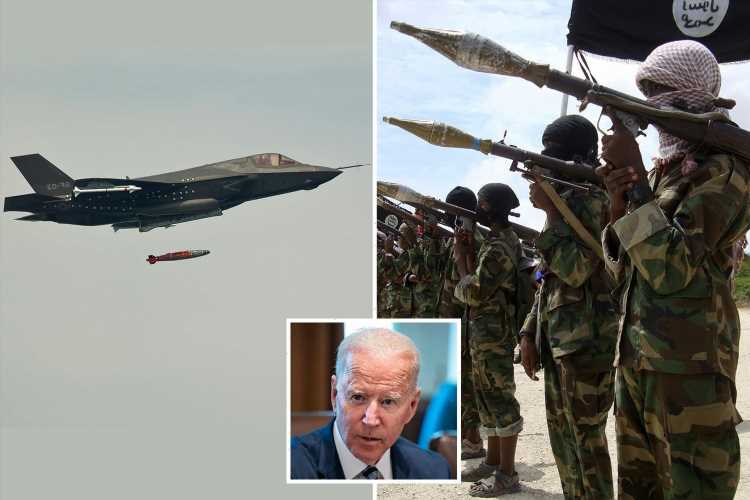PRESIDENT Joe Biden was forced to order his first major air strike on Jihadi targets in Somalia since coming to power.
US fighter jets bombed the Al-Qaeda affiliated group al-Shabaab in the western town of Galkayo on Tuesday, the Pentagon said, marking Biden's first attack on Islamist militants in the African country.
The US military command for Africa (AFRICOM) joined Somali government forces to conduct "one air strike in the vicinity of Galkayo, Somalia today against al-Shabaab", Pentagon spokeswoman Cindi King told AFP yesterday.
"A battle-damage assessment is still pending due to the ongoing engagement between al-Shabaab and Somali forces, however the command's initial assessment is that no civilians were injured or killed as a result of this strike," she added.
This is the first US strike on Somali targets since January 19 – a day before Biden was inaugurated President – when AFRICOM announced it killed three Shabaab militants in two air strikes in Jamaame and Deb Scinnele.
The air strike marks a new turn in the Biden administration's military strategy, which had previously restricted the use of drones against jihadi groups outside US theaters of war.
BATTLE READY
This is the first air strike in Somalia since December when US fighter jets successfully killed eight alleged al-Shabaab terrorists and wounded another two in country's south.
The people killed in the attack, which took place near the town of Jilib on December 10, were reportedly explosives experts working for the group.
Aerial footage released by the US Africa Command (Africom) shows a pair of crosshairs hovering over a small building before it is struck and explodes.
A fire can then be seen burning and smoke rising from one side of the structure, while people can be seen running out of a number of larger building nearby.
The US military said no civilians are thought to have been killed or injured in the strike.
There are fears the Sahel region could descend into further bloodshed following the death of Boko haram warlord Abubakar Shekau in June.
Shekau is said to have blown himself up as he was hunted down by rival terror group Islamic State West Africa Province (Iswap), which is now poised to dominate the region.
The reported death of the world's longest serving terrorist leader – who was once rejected by ISIS for being too radical – leaves a vacuum which could spark yet more bloodshed, analysts say.
"There's division among Shekau's followers about whether to join Iswap now or fight Iswap," Jacob Zenn, editor of the Jamestown Foundation Terrorism Monitor, told the BBC.
"There was never a plan for the dictator of the group meeting his demise. It appears there will now be a chaotic period."
Reports claim some Boko members have disbanded or switched allegiance, but at least one faction is staying loyal to the late leader.
Experts say they could join forces with other Islamist groups and wage renewed war against Iswap – with millions of civilians caught in the middle.
Al-Shabaab is an Islamist group active in Somalia and Kenya as well as Yemen and whose militants have been responsible for a number of large attacks in recent years.
WHO ARE Al-SHABAAB?
Al-Shabaab is an Islamist group founded in 2006 and active in Somalia and Kenya as well as Yemen.
The group's name means "The Youth" in Arabic.
It has been designated a terrorist organisation by several governments, including the US, UK, Malaysia, and UAE.
The US State Department also has open bounties out on several senior commanders, including one for $6million (£4.5million) on leader Ahmad Umar.
The latest estimates suggests the group has between 7,000 and 9,000 troops.
The group's militants have been responsible for several deadly attacks in recent years.
In October 2017, two truck bombings in Mogadishu, one of which caused the collapse of a hotel, killed at least 587 and injured more than 300.
The attack was the deadliest in Somalia's history.
The group was also responsible for a gun attack on the Westgate shopping centre in Nairobi, Kenya, in which 67 people died.
IRAQI ATTACKS
In February, Biden was forced to order his first air strike in Syria following rocket attacks on American targets in neighbouring Iraq.
The U.S. dropped seven 500-pound Joint Direct Attack Munitions ( JDAMs) reportedly killing 22 at a crossing used by Iranian-backed militia groups to move weapons across the border.
The U.S. appeared to be retaliating for a February 15 rocket attack on the American military base at Erbil International Airport – which was later claimed by the Guardians of Blood Brigade.
The U.S. has not definitively blamed any specific group for the outrage or attributed it to any Iranian proxies in the region, but the administration had made it clear where it places the blame.
"At President Biden's direction, U.S. military forces… conducted air strikes against infrastructure utilized by Iranian-backed militant groups in eastern Syria," said Pentagon spokesman John Kirby after last night's strike.
Kirby said that Biden ordered the strikes at Al Bukamal after consulting with U.S. allies, including coalition partners.
Source: Read Full Article





